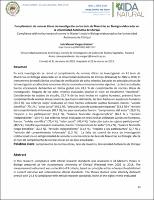Cumplimiento de normas éticas de investigación en las tesis de maestrías en biología elaboradas en la Universidad Autónoma de Chiriquí.
Resumen
In this research, compliance with ethical research standards was reviewed in 41 Master's theses in
Biology prepared at the Autonomous University of Chiriquí (Panama) from 2002 to 2018. The
measurement instrument was a checklist of 8 criteria, based on principles ethics of research established
in current national and international ethical standards. The theses studied were ethically deficient
overall with 24.3 % compliance with ethical research standards. None of the eight criteria evaluatedreached the level of ethically "excellent". Considering the study subjects, 32.7 % of the theses made on
human subjects presented good compliance with ethical standards; while the theses made in non human subjects (23.3 %) were deficient. The best evaluated criteria in theses made using human subjects
were: "scientific validity" (79.1 %), "social value": (56.2 %), "fair selection of participating subjects" (53.1
%) and " review of informed consent (48.7 %); the worst evaluated were: "author's commitments" (28.9
%), "respect for the participants" (16.2 %), "favorable risk-benefit balance" (16.2 % and "independent
review" (10, 4 %). The best evaluated criteria in theses made using non-human subjects were: "scientific
validity" (75.4 %), "social value": (45.4 %), "fair selection of participating subjects" (40, 5 %); while the
worst evaluated were: "author's commitments" (27.2 %), "favorable risk-benefit balance" (22.2 %),
"independent review" (11.9 %), "respect participants" (2.7 %) and "review of informed consent" (1.3 %).
The lack of an institutional research ethics committee and the non-obligation to submit Master's theses
in Biology to ethical standards; affects the level of compliance with ethical standards in the theses
studied.

